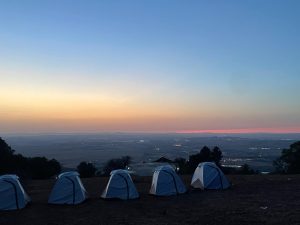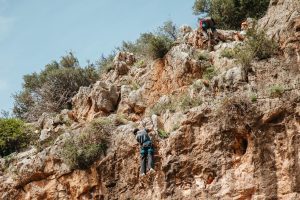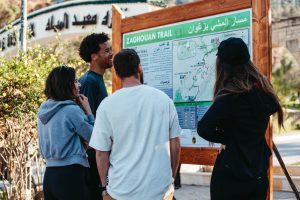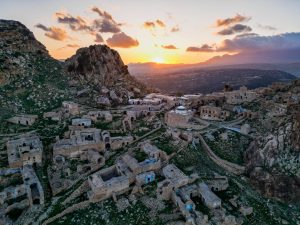Hiking on A Slice of Paradise: Trekking Trail Boosts Eco-Tourism in Northern Tunisia
On a warm sunset evening, an unusual sight can be spotted at the top of Djebel Zaghouan in eastern Tunisian. Two ministers are seen setting up their tents, accompanied by local artisans and small business owners, all ready to witness the orange shadows overtake the valley’s breathtaking landscapes.
It is June 26th, 2024, and the TransTunisia Trekking Trail (4T) has been officially launched. Started almost two years ago, in October 2022, this initiative has come a long way to see government representatives and locals join hands to stargaze in this camp setting.
“It was really the challenge for us: to ensure that the locals not only accepted but embraced this project and made it their own,” recalls Fatma Ben Nour, Country Manager at Leaders International, the NGO behind the 4T.

Empowering by Listening: Putting Local Communities First
Implemented by Leaders International in partnership with GIZ Tunisie, this ambitious project aims to promote eco-tourism in Tunisia, with the support of the European Union and BMZ under the Tounes Wijhetouna Programme. By establishing a “world-class trekking trail that will draw adventure tourists from across the globe”, the 4T initiative not only promises a unique outdoor experience but also aims to bolster local economies, preserve the environment, and foster community engagement.
“One of the first goals of the 4T project is to attract both domestic and international travellers to less-served areas in ? northern Tunisia, from Kerkouane to Tabarka through Aïn Drahem, El Kef, Zaghouan, and Sidi Jdidi,” explains Fatma.
Inspired by the epic Jordan Trail, the 4T proposes four signposted routes stretching across 450 kilometres. Along these routes, a myriad of “experiences” is available, ranging from hiking, cooking classes, rock climbing, donkey rides and mountain biking. They also include cultural and gastronomic experiences, in an effort to help preserve local traditions.
“Locals were very skeptical, if not fervently opposed to the idea at the start, because they had seen so many initiatives trying to come and exploit their area, without listening to their realities or their needs,” Fatma recalls. She notes that, by engaging with local communities, the 4T has ensured that the benefits of alternative tourism trickle down, empowering local Small and Medium Enterprises and creating more jobs in rural areas.
“The 4T project has shown us the importance of involving local communities and working at their pace,” says Fatma, citing the example of Mohamed El-Komsi, Managing Director of Zaghouan Aventure.
He shares his experience: “We used to be tourists just like our customers: we are passionate about mountain sports so we decided to launch our adventure company to enliven those rocks through mountain sports.”
He says the 4T project has created a major dynamic in Djebel Zaghouan, bringing together all service providers, which would have never been imaginable back in the early 1990s.
“A full economy has now come to life in the area and we now see tourists from all over the world, including climbers, speleology practitioners and families,” the young entrepreneur rejoices.

Trekking Trails with a Purpose
After extensive field work, the project developed a website and a mobile application to promote the various segments of the trail and associated experiences. Addressing the concerns of the local communities, 4T paid particular attention to developing a project that not only attracts tourists but also benefits the population in a sustainable and long-lasting manner.
“The 4T project is not just about creating trails; it also focuses on economic sustainability,” stresses Fatma. By providing targeted capacity-building and financial support for micro, small, and medium enterprises (MSMEs) in tourism services, the project has fostered local economic growth. Lodging, transportation, catering, and local artifact production are among the areas receiving substantial support.
An artisan from Aroma Oil Care, one of the “experiences” proposed through the trail shares, “The project has allowed us to create a space where visitors can learn about our traditions. It has expanded our activities and significantly enhanced the visitor experience. We now offer workshops on plant collection and distillation, providing a unique and educational experience for our guests.”
According to Katrin Gerhard, Head of Component – Promotion of Sustainable Tourism at GIZ Tunisia, the 4T initiative has already supported 77 sustainable tourism experiences across several governorates, “and we are extending this support to 23 more in the south.”
Local guesthouses and restaurants like Dar Zriba, a tourist activity centre, have also been at the forefront of this new adventure trail. Combining “the charm of the past with the comforts of the present”, the owner says Dar Zriba showcases the local traditional cuisine by “taking visitors on a journey of heritage flavours, offering friendly events, leisure activities and spaces to resolve everyday life troubles.”

Sustainability at the Core
The pristine environments offered throughout the trail also seek to make visitors realise the importance of safeguarding Tunisia’s heritage and natural resources. With its team of experts, the 4T project ensures rigorous monitoring of tourist activities to ensure minimal environmental impact.
As Mohamed El-Komsi notes with laughter “many of our visitors wonder about the lack of engines in our facilities. To which we reply ‘physics and body mechanisms are our engines!’”
Like the Zaghouan Aventure company, the 4T businesses are committed to sustainable environmental policies. Measures are in place to manage waste, reduce carbon footprints, and protect natural habitats. Efforts that are crucial in maintaining the ecological balance and ensuring that the natural beauty of Tunisia remains unspoiled for future generations.
Gaïa’s Garden, an agroecological farm and guest table located in Ain Asker, seeks to raise visitors’ awareness of sustainability by offering “an immersion in a well-preserved rural landscape.” “We offer activities such as donkey rides and cooking classes and serve 100% slow-food. With this homemade cuisine, we introduce visitors to a new way of tasting and appreciating Tunisian culinary specialties.”
For Fatma, this is where the collaboration with the authorities came into play. “It helped maintain the balance between tourism development and ecological sustainability. Creating an environment where visitors can enjoy the natural beauty without compromising its integrity for future generations.”

Looking ahead, the project implementers hope for further funding, with plans to extend the trail to more comprehensive trekking experiences. “Our goal is to make the 4T trail a benchmark for sustainable tourism in Tunisia,” notes Fatma.
Her team is also working on certification programmes for local businesses to enhance their expertise and service quality. “Certification is a crucial step for these young entrepreneurs who have started developing their projects post-2011. This will help them gain recognition and ensure a high standard of service for tourists.”




























 Syria
Syria 


